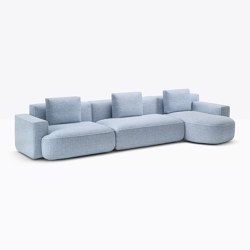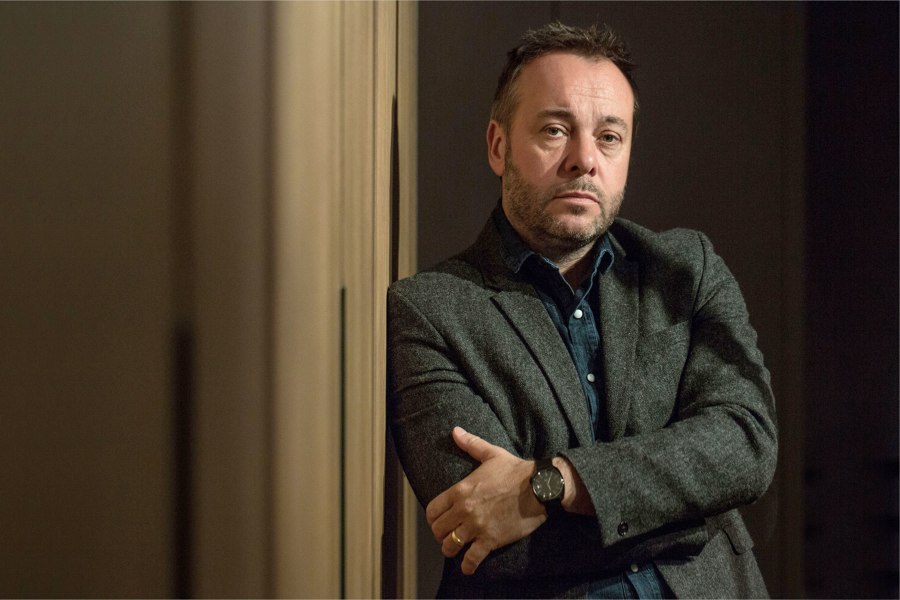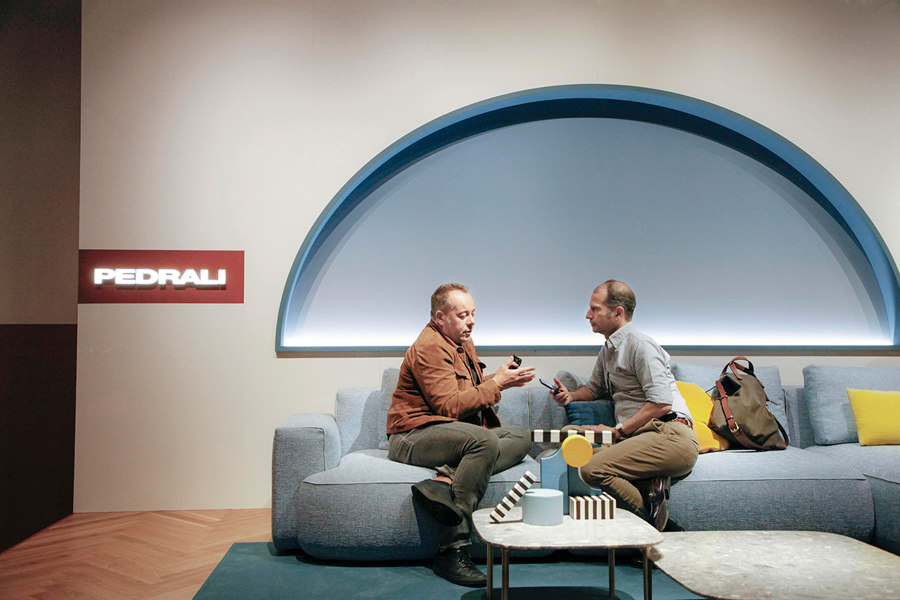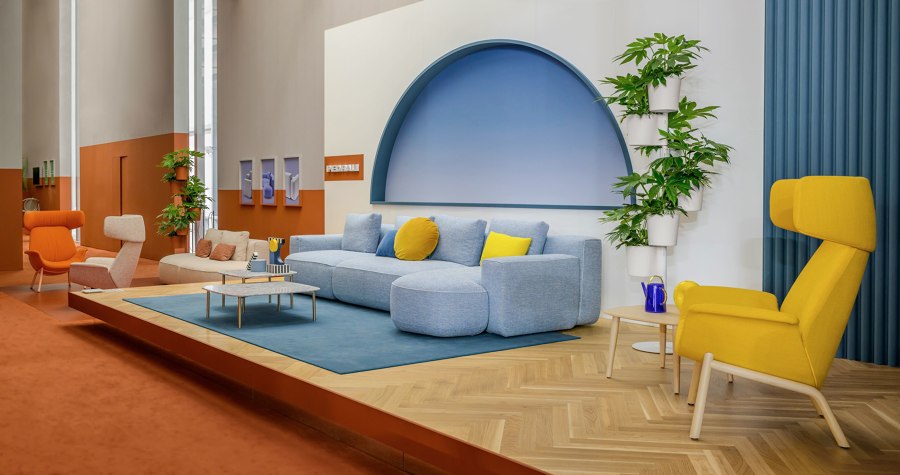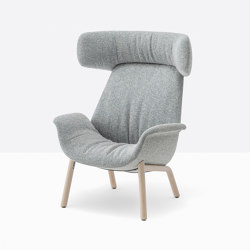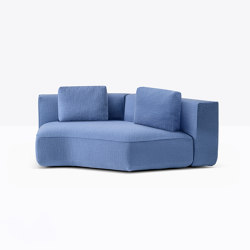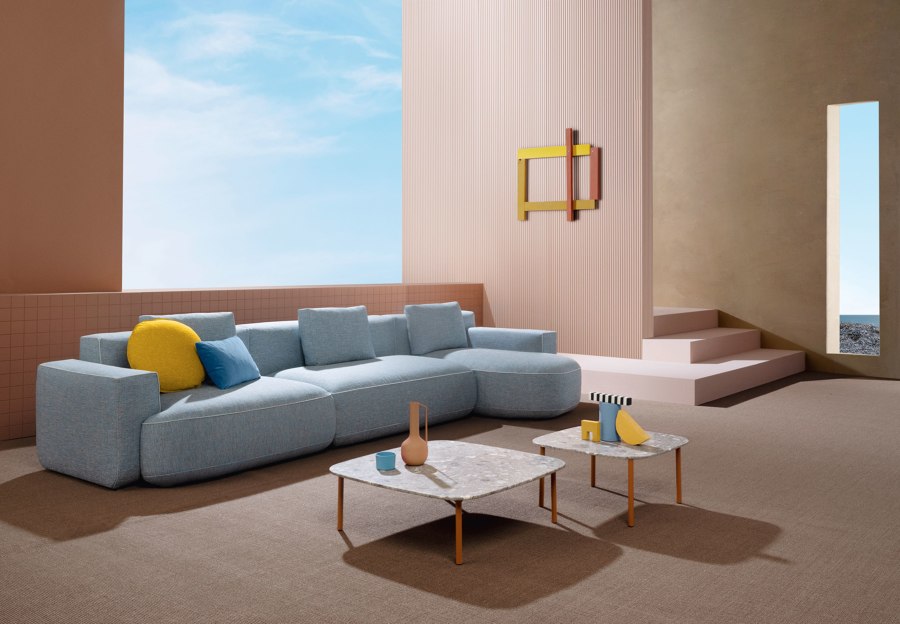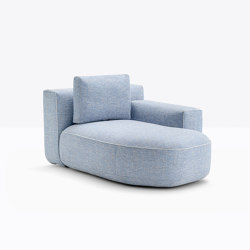'A residential sofa “in between”': Patrick Norguet for Pedrali
Storia del Marchio di Simon Keane-Cowell
MORNICO AL SERIO (BG), Italia
27.06.22
The French designer's most recent project with the Italian furniture expert is a modular structure that befits the ever-changing nature of our contemporary interiors. We sat down with him at Salone del Mobile to learn more.
'Jeff' at Pedrali's Salone del Mobile installation. Project by Calvi Brambilla, styling Studio Salaris. Photo: © Ottavio Tomasini
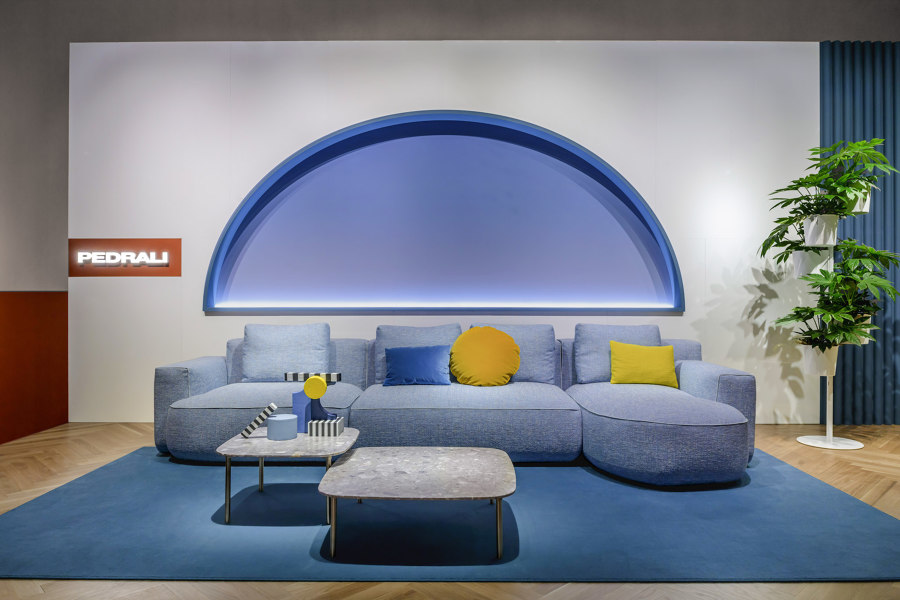
'Jeff' at Pedrali's Salone del Mobile installation. Project by Calvi Brambilla, styling Studio Salaris. Photo: © Ottavio Tomasini
×I knew a Jeff once. Nice guy. It's one of those universal names that seems to suggest a no-nonsense reliability. Someone you can steal horses with, as they say.
Apt then that French designer Patrick Norguet's newly launched modular sofa system for Pedrali should go by the same moniker. As times become more uncertain and the landscapes of our interiors – be they home, work or a hybrid of the two – increasingly flexible, there's, perhaps unsurprisingly, a return to familiar, dependable furniture typologies that both visually promise, and then actually deliver, comfort for users, while allowing an open-ended adaptability.
Patrick Norguet (top) in conversation with Architonic's Editor in Chief Simon Keane-Cowell
'The idea was to create a residential sofa “in between”,' the Paris-based creative tells me as we take a seat at this year's Salone del Mobile in Milan 'because in different colours and combinations you can imagine it in the lobby of a hotel, too. It's a very simple system that’s modular and configurable.' Norguet's natural modesty belies the painstaking consideration he's given to this micro-architectural programme, where linear and corner elements combine with chaise longues and end pieces to create structures that dialogue elegantly with the space around them.
As times become more uncertain and the landscapes of our interiors increasingly flexible, there's a return to familiar, dependable furniture typologies that both promise and actually deliver comfort for users
For me, there’s a touch of art deco about the contrast between Jeff’s squared backrests and the rounded corners of the richly upholstered, polyurethane-foam seating, not to mention the concealed feet that lend the sofa a certain visual levity. ‘It's just delicate. It's not over-designed, you know? Sometimes you can smell it – the balance between the shape, the lines, the tension. Sometimes you can imagine a product that is not over-designed. And if it is not over-designed, it is not fashion, and then you can start to talk about a timeless product.’
Whether in a fair environment (top, Project Calvi Brambilla, Photo Ottavio Tomasini) or a more minimalist setting (bottom, Art Direction Studio FM, Photo Andrea Garuti), the modular system can be assembled to fit any space. Styling (both): Studio Salaris
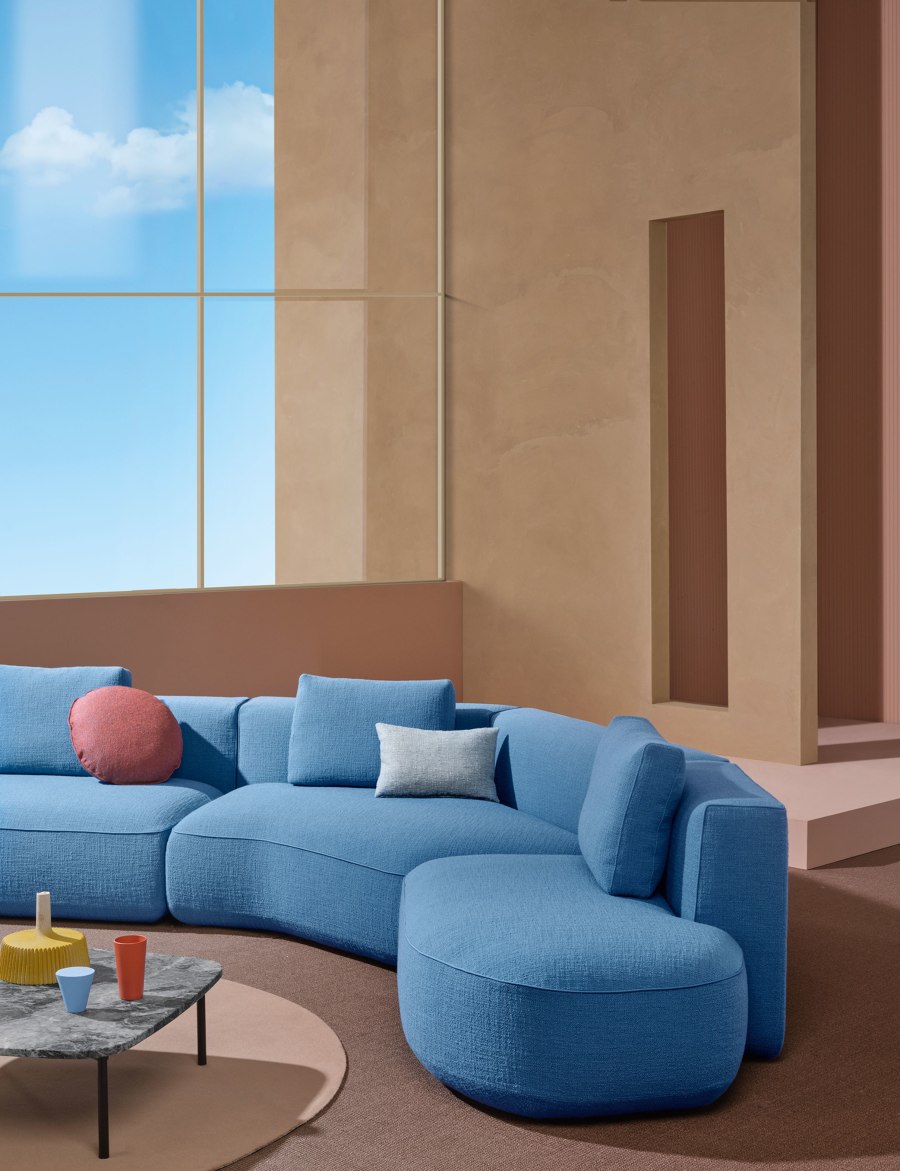
Whether in a fair environment (top, Project Calvi Brambilla, Photo Ottavio Tomasini) or a more minimalist setting (bottom, Art Direction Studio FM, Photo Andrea Garuti), the modular system can be assembled to fit any space. Styling (both): Studio Salaris
×Patrick Norguet: My job is to help companies have a real strategy. I come from the fashion industry and I spent two years at Louis Vuitton, where I learnt a lot. My passion is brand and process. So, when I work with a company, the idea is to share together a strategy, not necessarily to design new products for the sake of it. This would be like pollution. The market is full. So, the intelligence of the companies is key, and the intelligence of the people around the products. And this I have with Pedrali.
Architonic: Right. Well, my fundamental question when I meet a designer, when we're talking about a new product, is always 'Why do we need this?' Why do we need the new Jeff sofa for Pedrali?
PN: It’s a product that comes from the Covid episode, where there was the new evolution of working from home. People stayed at home, not spending money. The restaurants closed, the hotels closed, and people wanted to change their domestic landscape, change their kitchen, change their sofa. Pedrali and I had a long exchange on this.
'The idea was to create a residential sofa “in between”, because in different colours and combinations you can imagine it in the lobby of a hotel, too. It's a very simple system that’s modular and configurable'
It's not a major strategic change because a couple of years ago Pedrali had already started to introduce residential products along with those for the office and for contract. But the idea was to create a residential sofa “in between”, because in different colours and combinations you can imagine it in the lobby of a hotel, too. It's a very simple system that’s modular and configurable. We also discussed a lot about the price. It’s about being honest and having the right, fair price at the end of the day.
Jeff's individual elements are made from non-deformable polyurethane foam and raised off the ground by small feet to form a levitating architectural landscape of comfort. Art direction: Studio FM, Styling: Studio Salaris, Photo: © Andrea Garuti
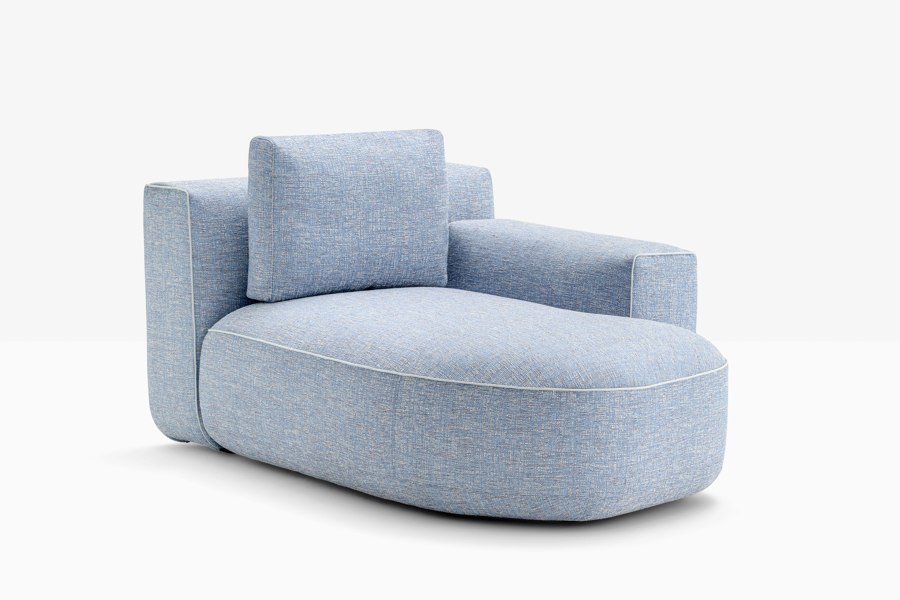
Jeff's individual elements are made from non-deformable polyurethane foam and raised off the ground by small feet to form a levitating architectural landscape of comfort. Art direction: Studio FM, Styling: Studio Salaris, Photo: © Andrea Garuti
×AT: So, you can configure Jeff. For example, if there are two of you living at home and one of you is working, for example, you can configure it to fit the functional requirements of your residential space, with, as you say, people not wanting to go back to the office, people at home more, the home becoming a hub…
PN: Yes, but at the same time you can imagine it in the entrance or the lobby of a company or waiting room. We spent a lot of time on the quality, of course, to be sure in the end that the form is comfortable. And there’s a little contrast between the seat and the backrest. But it’s a very basic volume, very strict. Yet, at the same time, it's just delicate. It's not overdesigned, you know. It's a balance. It's like music, or like the word when you write something.
'I'm at an age now where I can select my own clients and I only work with nice people. Because I’m sure of this: a nice product comes from nice people'
AT: Do you think that the responsibility of the designer has changed over the last couple of decades? Do you think that your role has changed?
PN: Well, I was in the street this morning and saw a big ad for a new chair. Some big event with a French designer. There’s no sense to it. It’s just marketing and communications to promote some event this week in Milan. I prefer to spend a lot of time immersed in manufacturing. It's a dialogue – and this is a responsibility of the designer. Not more and more ego. My job is to be quiet, to be modest and to listen to people. I'm at an age now where I can select my own clients and I only work with nice people. Because I’m sure of this: a nice product comes from nice people. The rest we don't need anymore.
© Architonic


